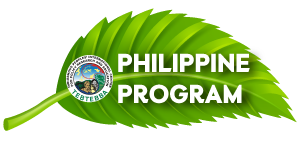
COVID-19 Support
ESF
CRS
Tebtebba Emergency Support Fund (ESF) to address impacts of the coronavirus on Indigenous Peoples
To date, the current global coronavirus pandemic has impacted almost all nations of the world. To address the pandemic, nations have instituted measures that seek to address, mitigate and halt its spread, and are seeking ways to develop potential vaccines to eradicate the coronavirus (SARS-CoV-2).
For indigenous peoples, the pandemic has the potential to impact them disproportionately. Given the situation of marginalization where access to basic services, such as health services, are insufficient or beyond the reach of a big number of indigenous peoples’ communities, the impacts of the coronavirus disease (COVID-19) would be very grave. This marginalization is also reflected in how most governments provide very minimal, if absent, support for indigenous peoples in providing not only healthcare and protection, food and other basic support, among others. Added to these are the loss of livelihoods and access to lands, forests, waters and resources due to lockdowns or imposition of restrictions in mobility. Lockdowns and related restrictions also open up possibilities of violation of indigenous peoples’ rights, including potential encroachment, land-grabbing, expropriation of their lands, territories and resources, among others.
Partners of Tebtebba (ELATIA, Asian Indigenous Women’s Network, IFAD-IPAF, UPAKAT) have already been sharing the impacts of the pandemic on them and their communities, how they are addressing the situation and their urgent needs. In response, Tebtebba has reached out to some of its funders to request possibilities of realignment of funds to help partners in need. In solidarity, some of our funders have agreed to allocate a small amount of unspent funds.
1. Erumanen ne Menuvu Kamal, North Cotabato
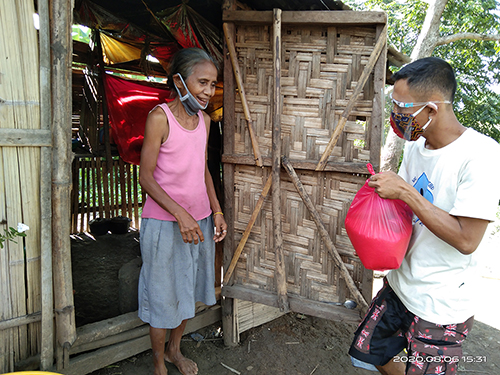 The Erumanen ne Menuvu dilabped ne tavang (emergency support), a traditional practice of extending support of ‘who have’ to those ‘who have nots’ in time of crisis, prevented the entry or spread of COVID-19 within their territory, advanced their initiative in building a healthy environment and a mechanism which promoted their advocacy on sustainable use of resources.
The Erumanen ne Menuvu dilabped ne tavang (emergency support), a traditional practice of extending support of ‘who have’ to those ‘who have nots’ in time of crisis, prevented the entry or spread of COVID-19 within their territory, advanced their initiative in building a healthy environment and a mechanism which promoted their advocacy on sustainable use of resources.
To be able to implement the project, Kamal organized a crisis response team guided by the spiritual, political, economic and cultural and social (SPECS) framework, a group of volunteers to assist in information dissemination, coordination and delivery of relief to 871 households in 16 barangays.
The deyangba or the women's sector initiated the production of face masks from traditional fabric and face shields. They also partner with other organizations to receive training on soap making from the herbs within their territories. Their products were sold within the territory. Further, the beguwater or youth were trained on sustainable ecological agriculture and were instrumental in establishing 11 communal farms and in promoting their slogan which is the food-always-in-the-home.
2. Manobo Lumadnong Panaghiusa sa Arakan (MALUPA), Arakan, North Cotabato
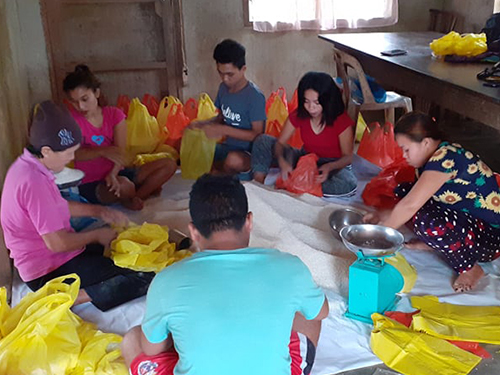 The Manobo way of life changed with the implementation of lockdown due to the COVID-19 pandemic. The emergency support fund was able to procure food items and hygiene kits that were distributed to 1,000 indigenous households in 12 barangays. These households were also provided with information and education on COVID-19 pandemic.
The Manobo way of life changed with the implementation of lockdown due to the COVID-19 pandemic. The emergency support fund was able to procure food items and hygiene kits that were distributed to 1,000 indigenous households in 12 barangays. These households were also provided with information and education on COVID-19 pandemic.
Organizationally, MALUPA actively cooperated with the existing tribal association and local government units for other support e.g. vegetable seeds from the Agricultural Training Institute of the Department of Agriculture. Volunteerism was observed thereby strengthening MALUA as an organization.
3. Panaghiusa alang sa Kaugalingnan ug Kalingkawasan (PASAKK), Agusan del Sur
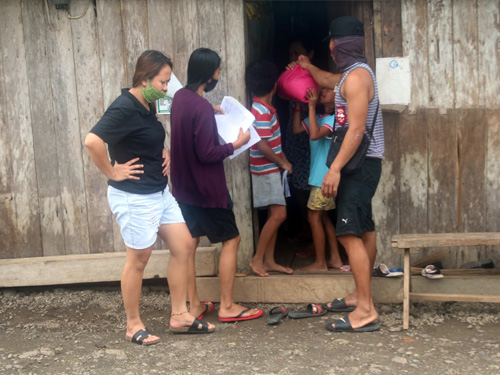 A total of 880 members and associate members of PASAKK that include 126 women with 1659 children benefited from the project. Of these beneficiaries, 57 were persons with disabilities (PWDs), 239 were Senior citizens, 8 were pregnant women and 81 were solo parents.
A total of 880 members and associate members of PASAKK that include 126 women with 1659 children benefited from the project. Of these beneficiaries, 57 were persons with disabilities (PWDs), 239 were Senior citizens, 8 were pregnant women and 81 were solo parents.
PASAKK was also able to produce and distribute flyers regarding COVID-19 to its constituencies. Tarpaulins were also printed and were hung on the side of the vehicle that went around the towns providing basic information and health protocols to prevent the spread of COVID-19 through a loudspeaker placed on top of the vehicle. PASAKK also negotiated with a local FM radio station to air basic information on COVID-19 prepared by PASAKK in Manobo language.
Similar to the food for work program introduced by humanitarian organizations after a disaster, PASAKK initiated a similar activity in the 10 indigenous communities to ensure the sustainability of the efforts to protect the environment towards sustainable development. Two days of food for work was done in each community. Every PASAKK member that participated in the food for workreceived 7 kilograms of rice per day.
4. Timuay Justice and Governance (TJG), Maguindanao
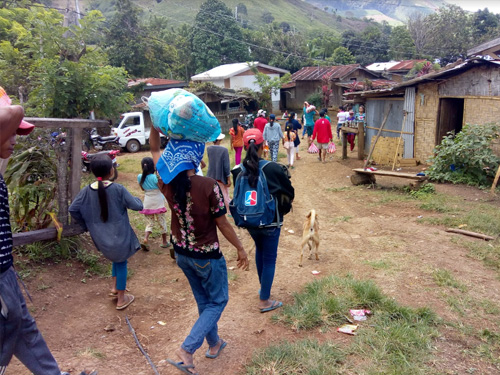 The emergency support fund was able to deliver and distribute 500 food packs (5 Kilos of rice with 5 pieces of dried fish, half kilo of sugar and native coffee) hygiene kits (3 pieces of toothbrushes/toothpastes, 3 facemasks and alcohol) and vegetable seeds to more or less 500 non-Moro Indigenous Peoples in barangay Lamud, South Upi, Maguindanao.
The emergency support fund was able to deliver and distribute 500 food packs (5 Kilos of rice with 5 pieces of dried fish, half kilo of sugar and native coffee) hygiene kits (3 pieces of toothbrushes/toothpastes, 3 facemasks and alcohol) and vegetable seeds to more or less 500 non-Moro Indigenous Peoples in barangay Lamud, South Upi, Maguindanao.
TJG volunteers, Tribal Leaders, Youth, Women and Religious Sectors and LGUs particularly barangay Lamud Officials and AFP/PNP (peace order and security sector) have joined efforts to deliver the relief.
5. Samahan ng mga Katutubo sa Napsan at Bagong Bayan (SAMAKANABA Inc.), Palawan
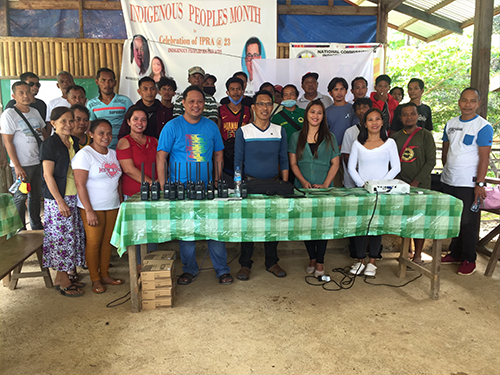 SAMAKANABA Inc. covers 49,385 hectares of ancestral lands and waters that are rich with terrestrial and marine resources within barangays Napsan, Bagong Bayan, and Simpocan. These attracted many outsiders, especially illegal loggers and wildlife poachers to invest in their ancestral domain.
SAMAKANABA Inc. covers 49,385 hectares of ancestral lands and waters that are rich with terrestrial and marine resources within barangays Napsan, Bagong Bayan, and Simpocan. These attracted many outsiders, especially illegal loggers and wildlife poachers to invest in their ancestral domain.
To intensify the surveillance and monitoring of their ancestral domain, SAMAKANABA had established a group called ‘Bantay CADT’ that serves as forest warden and requested support from Tebtebba on the purchase of additional 18 units of handheld radio to strengthen their communication.
The provision of the handheld radios resulted in updated eventualities inside the ancestral domain and increased apprehension rates of illegal loggers and decreased illegal loggers thus increasing forest protection.
Tebtebba Community Resilient Support (CRS) to address COVID-19 impacts
The COVID-19 pandemic continues to impact severely on health and economy worldwide. Studies attribute an enabling condition for the occurrence of COVID-19 and future epidemics/pandemics on wanton abuse of nature: environmental/ecosystems degradation from deforestation and biodiversity loss, unabated extraction of natural resources, climate change, pollution, among others.
Indigenous peoples, while they have the least contribution to the environmental degradation, are often gravely impacted by the backlash of nature. In this pandemic, indigenous peoples are disproportionately being impacted by the coronavirus as well as measures being undertaken by governments to address this. Their continuing marginalization (e.g., lack/insufficient basic services, in particular health services; discrimination) are exacerbating this situation. Thus indigenous communities often suffer from lack/insufficient health support (masks, alcohol, etc.) and food supplies from the government, do not receive appropriate and timely COVID-related information, suffer from lack of food and basic necessities due to lockdowns; loss of employment and economic opportunities; or are victims of continuing violation of their rights (e.g., cases of increased land grabbing, continuing mining operations, etc.) in the guise of pandemic-related measures.
In spite of this situation, indigenous communities are proactively addressing COVID-19 impacts in their communities. They are employing their various cultural practices and traditional knowledge of addressing disasters to ensure the survival and well-being of their communities. Tebtebba has also provided much-needed help and support to its partner indigenous organizations and communities in April 2020 to address urgent health and food needs. Given the continuing impacts of COVID-19 in indigenous communities, and in response to request from partners to support their efforts beyond immediate health and food needs, Tebtebba is again providing modest support to a few partners in the Philippines.
Objectives:
The Tebtebba Community Resilient Support to address COVID-19 impacts(CRS COVID-19) for Tebtebba partners and communities in the Philippines would like to contribute to enabling conditions for communities to increase resilience among their people and their ecosystems in their customary territories or ancestral domain.
Specifically, the project would like to support initiatives of partner indigenous peoples’ communities to:
- Strengthen indigenous food systems;
- Increase food sufficiency and income in the level of family, group, community; and
- Increase the capacity of communities on social enterprise, post-harvest technologies, and food processing
A. Manobo Lumadnong Panaghiusa sa Arakan (MALUPA), Arakan, North Cotabato
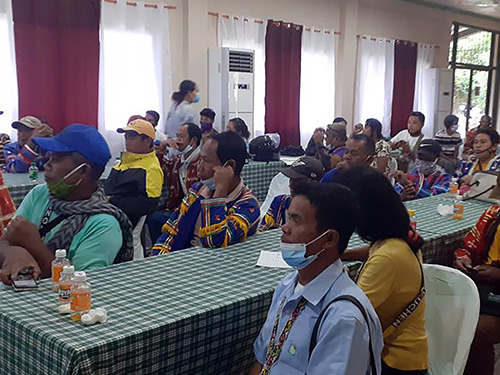 COVID 19 reached the Arakan Valley of Cotabato Province at a time when the majority of the people are chemically dependent farmers. Past attempts to convince these farmers to shift to more sustainable farming was difficult considering that the chemical-based farming system promised high yields. When MALUPA received assistance from Tebtebba, the leaders undertook an educational campaign to reintroduce, promote the revival and strengthen the Manobo system of farming. Among the key messages disseminated is that food grown through traditional farming system is free from chemicals, enhance resistance against sickness which is very important especially during the COVID-19 pandemic. Another that is equally important is that traditional farming ensures availability of food for everyday needs all year round. Further, the role of the women and youth in the implementation is a key to the success of this endeavor.
COVID 19 reached the Arakan Valley of Cotabato Province at a time when the majority of the people are chemically dependent farmers. Past attempts to convince these farmers to shift to more sustainable farming was difficult considering that the chemical-based farming system promised high yields. When MALUPA received assistance from Tebtebba, the leaders undertook an educational campaign to reintroduce, promote the revival and strengthen the Manobo system of farming. Among the key messages disseminated is that food grown through traditional farming system is free from chemicals, enhance resistance against sickness which is very important especially during the COVID-19 pandemic. Another that is equally important is that traditional farming ensures availability of food for everyday needs all year round. Further, the role of the women and youth in the implementation is a key to the success of this endeavor.
There are four types of traditional farming of the Manobo namely the Kuho, Kamot, Tolihobba, and the Sovokaddan no kamot. The project established one hectare of kuho in each of the 10 sites in barangays Kabalantian, Datu Mantangkil, Katipunan, Datu Ladayon, Tumanding, Salasang, San Miguel, Ganatan, and two sitios of Lanao Kuran and five hectares of tolihobba in barangays Kitao and Lanao Kuran. These areas were cultivated with vegetables, root crops, herbs, and fruit trees for the community's immediate food source and will be the source of seeds for the expansion of their farms into other barangays and into the establishment of kamot and sovokaddan no kamot.
The youth, despite having an advanced knowledge on science and agriculture realized that traditional farming has economic and environmental benefits for their tribe. Their newly discovered knowledge inspired them to help the tribal community on food security. This led to the formation of the Indigenous Peoples Youth Organization to support MALUPA in the promotion of kuho through education and awareness-raising.
On the other hand, the women were very much participative in the establishment of food security mechanisms such as kuho as they have the knowledge of traditional seeds and plants used by their elders. On this basis, they activated the Arakan Valley Indigenous Peoples Women Association in recognition that women play an important role and are committed to strengthening advocacy on food security.
B. Panaghiusa alang sa Kaugalingnan ug Kalingkawasan (PASAKK), Agusan del Sur
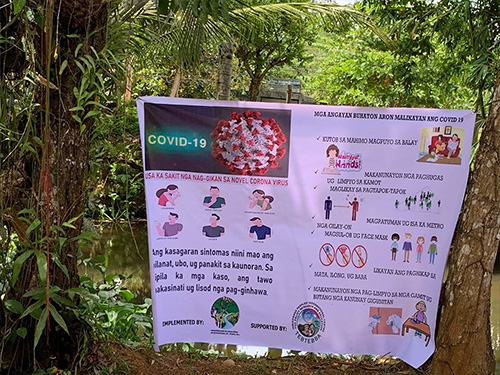 Access to safe potable water for indigenous communities has been seriously constrained by the economic impact of COVID-19. Prices of commercially distilled bottled waters are now beyond the reach of poor IP communities due to the continuing loss of work of daily wage earners and slow farm productivity already taking place and exacerbated by the pandemic. Currently, there are no other organizations working on this problem. PASAKK initiated to deal with the water problem through their project. They partnered with the 12 communities that they worked within the last 10 to15 years. Their community leaders became the focal persons of PASAKK in the implementation of the project. It also provided opportunities for women and youth to earn additional income to meet their personal needs and of their families during this pandemic and beyond.
Access to safe potable water for indigenous communities has been seriously constrained by the economic impact of COVID-19. Prices of commercially distilled bottled waters are now beyond the reach of poor IP communities due to the continuing loss of work of daily wage earners and slow farm productivity already taking place and exacerbated by the pandemic. Currently, there are no other organizations working on this problem. PASAKK initiated to deal with the water problem through their project. They partnered with the 12 communities that they worked within the last 10 to15 years. Their community leaders became the focal persons of PASAKK in the implementation of the project. It also provided opportunities for women and youth to earn additional income to meet their personal needs and of their families during this pandemic and beyond.
Typhoons Vicky and Auring have caused flash floods and landslides in Agusan del Sur that delayed the implementation of the project. PASAKK was able to put up a perimeter fence and by transplanting indigenous trees around the natural water source for the water station. The PASAKK Springwater station for purifying spring water from the source was constructed inside the PASAKK Agro-Ecotourism Farm and has started distributing and selling 200 gallons of purified water per day to indigenous communities for Php 20.00 per gallon. This resulted in the other refilling stations lowering their price from Php 30.00 to Php 25.00 per gallon.
Further, PASAKK continued awareness-raising on indigenous communities of the COVID-19 prevention by reproducing tarpaulins with messages to avoid COVID-19 infections in strategic locations of the communities and distributing flyers on COVID-19.
C. Timuay Justice and Governance (TJG), Maguindanao
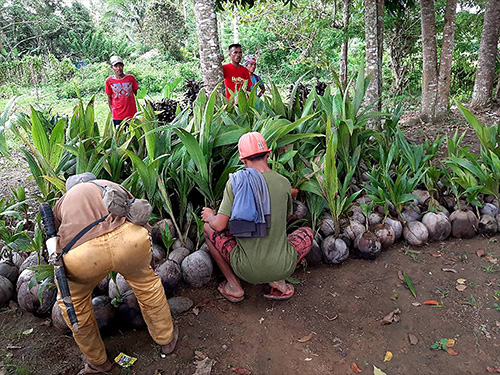 The COVID-19 pandemic has caused a big impact on the indigenous Teduray and Lambangian communities in Maguindanao. The agricultural sector is one of the most affected because the farmers have experienced a decline in the price of their agricultural products. For instance, corn was bought for Php 7.00 per kilogram that affected most of the farmers who borrowed their capital. Through the project, they hope to strengthen the sulagad, the traditional agricultural system of the Teduray and Lambangian, to sustain the food of the community and also reinforce the Plant, plant, plant program of the Department of Agriculture for families to produce their own fresh and healthy foods from their farms.
The COVID-19 pandemic has caused a big impact on the indigenous Teduray and Lambangian communities in Maguindanao. The agricultural sector is one of the most affected because the farmers have experienced a decline in the price of their agricultural products. For instance, corn was bought for Php 7.00 per kilogram that affected most of the farmers who borrowed their capital. Through the project, they hope to strengthen the sulagad, the traditional agricultural system of the Teduray and Lambangian, to sustain the food of the community and also reinforce the Plant, plant, plant program of the Department of Agriculture for families to produce their own fresh and healthy foods from their farms.
The project benefitted 450 families in barangay Itaw, South Upi Maguindanao and 550 families in barangay Rifao, Upi, Maguindanao. Apart from providing starter seeds and farm tools to the two communities, the project paved the way for the establishment of two communal farms in each of the communities that were planted with various crops. Most of the seeds were collected from the households and also envisioned that the farms would be the source of traditional seeds that can also be used in the other communities.
Information campaign on COVID-19 prevention was also done by producing materials (tarpaulins, flyers, and video) to disseminate COVID-19 prevention tips.
D. SILDAP Southeastern Mindanao
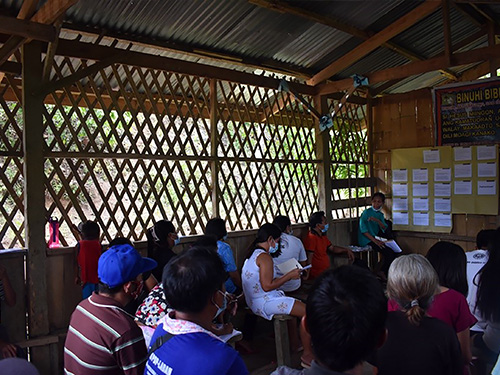 The COVID-19 pandemic impacted largely the indigenous peoples in rural areas. They are more deprived with regard to access to basic services from the government and other stakeholders due to some measures being implemented by the government to contain the spread of the pandemic. This hinders them from selling their farm products and buying their needs. Prices of farm products decreased and buyers were restricted to enter their communities. This resulted in the gradual selling of lands to migrants in low amounts just to have money for their survival. Despite all these conditions, indigenous people are very much open and actively coordinating the government units and other stakeholders in addressing COVID-19 and its possible impacts on their communities. Education campaign on the basic orientation about COVID-19 and learning about the primary protocol to avoid the virus causing covid-19 given to the IP communities that are partners of SILDAP. Providing basic health and safety protocols were also provided in the conduct of community activities to avoid local transmission if any.
The COVID-19 pandemic impacted largely the indigenous peoples in rural areas. They are more deprived with regard to access to basic services from the government and other stakeholders due to some measures being implemented by the government to contain the spread of the pandemic. This hinders them from selling their farm products and buying their needs. Prices of farm products decreased and buyers were restricted to enter their communities. This resulted in the gradual selling of lands to migrants in low amounts just to have money for their survival. Despite all these conditions, indigenous people are very much open and actively coordinating the government units and other stakeholders in addressing COVID-19 and its possible impacts on their communities. Education campaign on the basic orientation about COVID-19 and learning about the primary protocol to avoid the virus causing covid-19 given to the IP communities that are partners of SILDAP. Providing basic health and safety protocols were also provided in the conduct of community activities to avoid local transmission if any.
In order to strengthen community awareness on COVID-19 pandemic, SILDAP provided input on COVID-19 in Binuhi and Panangan communities. They also printed and installed learning materials in the two communities and distributed brochures for public information and dissemination. Participants of the IEC, especially the women, emphasized their realization that they should give more importance to the strengthening of their immune system.
IEC on the Ecological Solid Waste Management Act was also done and supported the communities in the installation of Material Recovery Facility at strategic areas of the community for the residents to deposit and segregate their garbage. Women and youth raised their concern on the collection of garbage that the LGU requires them to bring their garbage to the neighboring barangay for collection. With the active participation of barangay officials in the activity, barangay officials committed to following up at the municipal level regarding the collection of garbage from the barangay MRF instead of residents transporting their garbage to the neighboring barangays for collection.
The project was able to provide assistance to 200 families to start up their backyard gardens or farms to ensure that food is available on their tables. In Pangangan, the project provided capital for the women and youth organization’s corn coffee production and provided assistance in connecting them with buyers. As of December 2020, the organization started supplying vacuum-packed coffee in five outlets that were outside the province.
Reforestation was also done in both communities. Panangan river which is the main source of the residents for eel for food and income, the riverside was replanted with bamboo to prevent landslides and secure the reproduction of eel. The water source of Binuhi was also planted with mahogany and Bakan to preserve the water supply and prevent landslides. To ensure the continuous reforestation of these areas and to provide fruit-bearing trees for the residents, a tree nursery was established in both communities in partnership with the local People’s Organization who will also be in charge of sustaining the nursery for its members.
